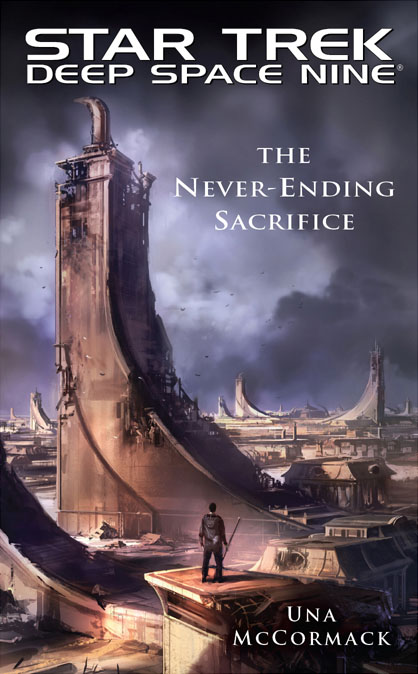I love Una McCormack's work. I may not have cared much for the B-plot in Hollow Men but the A-plot was absolutely grand. The Never-Ending Sacrifice, however, does something daring and should be acknowledged for it: its not just a good Star Trek novel, it's a good novel period. Had Una changed the names and places, the novel would function just as well as an independent science fiction piece.
The first thing one has to know about ST:DS9: TNES is it doesn't star any of the regular characters from the show. This is another daring thing, because most books depend on the "star appeal" of the original characters. Here, the protagonist is Rugal, a character who only showed up on Deep Space Nine for about ten minutes of screen time max.
Rugal's story is a fairly complex one. When the Cardassians were retreating from Bajor, he was left behind and adopted by Bajoran parents. Given the Cardassians treated the Bajorans nightmarish, this lead to a rather troubled by childhood. Rugal, himself, wasn't abused but grew up being told the Cardassians were a race of Space Nazis who did unconscionable things to the Bajorans.
Which is true.
The thing was, Rugal wasn't left behind deliberately. Indeed, he was effectively kidnapped from his parents due to the machinations of Gul Dukat. As a result, Starfleet ruled that Rugal was to be returned to Cardassia with his biological father. The fate of Rugal and his family was a story untold, until now.
The Never-Ending Sacrifice follows Rugal as he's exposed to an alien culture he's been taught to hate his entire life. The Cardassians are shown to be a complex society, neither wholly good or evil, with elements to admire as well as despise. One element I particularly enjoyed was the fact the Cardassians, not too long ago, were a starving broken people much the same as the Bajorans.
While Rugal's father loves him, he's not a particularly welcomed by the rest of the household. He's uninterested in befriending his new family as well, constantly trying to figure out means to escape back to Bajor. It is a heartbreaking yet fascinating analysis of what it means to be family in an inhuman society.
The novel chronicles Rugal's time through the early DS9 period to the Dominion War and beyond. Watching Rugal get drafted into the Cardassian military is fascinating, because it puts him in the perfect situation to understand not everyone is given a choice in an environment of oppression. Indeed, the first planet the Cardassian Union invaded was perhaps Cardassia itself.
This is not a typical Star Trek story. It does not have Rugal involve himself with ancient gods, space battles, or even epic examples of peace-keeping. Instead, it is a personal story of the shift in perspective by one person. It is a coming-of-age drama set against the backdrop of an interstellar war which the protagonist will not have any major effect on. Instead, he is a leaf buffeted across the winds of history.
Is The Never-Ending Sacrifice perfect?
Yes, yes it is.
This story is exactly everything it needs to be. From beginning to end, it handles a complex situation deftly and with aplomb. I cannot think of any complaints I have about the work. Is it the most enjoyable novel ever? No, but it moved me and there are few enough pieces of literature I can that about. I applaud Una McCormick for their work and wish them many future projects.
10/10

No comments:
Post a Comment
Note: Only a member of this blog may post a comment.